Introduction
As the landscape of artificial intelligence continues to evolve, organizations are presented with both unprecedented opportunities and significant challenges. Microsoft’s President Brad Smith emphasizes a thoughtful approach towards the development of superintelligent AI, urging businesses to balance innovation with ethical considerations. This perspective aligns with a growing recognition of the need for responsible AI practices, particularly as companies grapple with implementation hurdles and the complexities of integrating AI into existing workflows.
With a notable increase in the adoption of generative AI and Robotic Process Automation (RPA), organizations are beginning to harness the power of these technologies to enhance operational efficiency and productivity. As the demand for AI solutions surges, understanding how to navigate the intricacies of implementation while fostering a culture of responsibility becomes paramount for future success.
This article delves into the current state of AI, highlights practical strategies for effective implementation, and explores the ethical frameworks necessary to ensure that AI technologies serve not only businesses but the broader community as well.
Microsoft’s Perspective on the Timeline for Superintelligent AI
Microsoft President Brad Smith has articulated a measured perspective on the emergence of superintelligent AI, indicating that there is no chance of it becoming a reality soon. His cautious approach underscores the complexities that still need to be navigated in AI development. Smith’s insights resonate with a broader industry sentiment that advocates for responsible AI innovation, emphasizing the need to balance technological advancements with ethical considerations.
This balanced viewpoint empowers entities to focus on the powerful capabilities of current AI technologies while addressing implementation challenges, including data quality issues and the reluctance to integrate AI into existing processes. Numerous entities perceive AI projects as time-intensive, costly, and challenging to implement, which can deter adoption. However, with 878 respondents indicating the use of generative AI in at least one function, entities are beginning to see tangible improvements in their operations.
For instance, the FDA’s approval of 139 AI-related medical devices in 2022—a 12.1% increase from 2021—demonstrates the growing acceptance and integration of AI in healthcare. Furthermore, as projections indicate that by 2025, 50% of knowledge workers will employ virtual assistants, and with 54% of users agreeing that virtual personal assistants make their lives easier, the time is ripe for businesses to adopt existing AI solutions that enhance operational efficiency and productivity, particularly through automation. Before implementing GUI automation, companies faced significant challenges such as manual data entry errors, slow software testing, and difficulty integrating outdated systems without APIs.
As highlighted in recent case studies, GUI automation has proven effective in streamlining operations, reducing errors, and significantly improving workflow efficiency. This is a pivotal moment for entities to leverage these advanced tools rather than getting distracted by the speculative timeline of Microsoft no chance superintelligent soon.
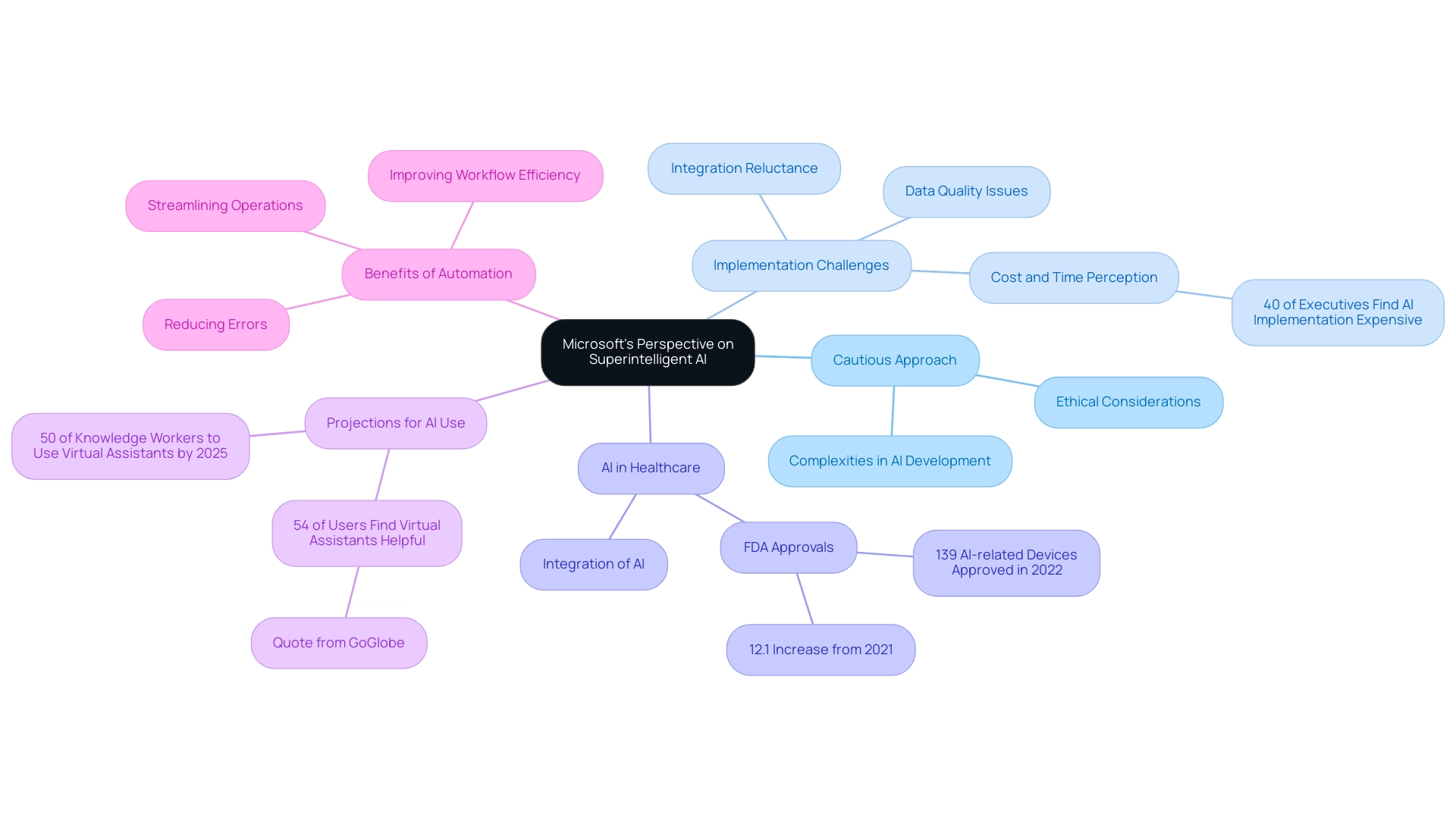
Challenges and Limitations in Achieving Superintelligent AI
The pursuit of superintelligent AI is riddled with considerable challenges and inherent limitations, which means Microsoft has no chance superintelligent soon. Developing algorithms that can learn and adapt beyond human intelligence is an intricate endeavor, marked by the need for transparency and accountability, particularly as 80% of customers believe a human touch is essential in validating AI outputs. This statistic underscores the critical demand for responsible stewardship in AI applications, where transparency and accountability are paramount.
To address implementation challenges and improve operational efficiency, businesses can utilize Robotic Process Automation (RPA) tools like EMMA RPA and Microsoft Power Automate. EMMA RPA automates repetitive tasks, significantly reducing errors and freeing up teams for more strategic, value-adding work. Microsoft Power Automate integrates seamlessly with existing systems, allowing for easy automation of workflows across various applications, thus improving employee morale by alleviating task repetition fatigue.
As entities strive to innovate, they must confront the pressing ethical considerations that accompany such advancements, including the removal of biases in algorithms. A pivotal concern is the quality of data utilized in AI training; without access to vast amounts of accurate information, the efficacy of AI systems is compromised. Additionally, a Forbes Advisor survey showed that 77% of consumers convey concern regarding possible AI-related job losses, emphasizing the societal impacts of these advancements and the necessity for measures such as re-skilling and job transition assistance to alleviate these worries.
As Justin Mauldin aptly states, as AI continues to advance at an unprecedented pace, it’s crucial to address the key challenges and ethical considerations that surround its development, particularly as Microsoft has no chance superintelligent soon becomes a reality. By recognizing these complex challenges, including possible obstacles to AI implementation, and dedication to ethical practices, while employing customized AI approaches, organizations can not only enhance efficiency and innovation but also guarantee that the shift to AI methods is both responsible and advantageous to the workforce.
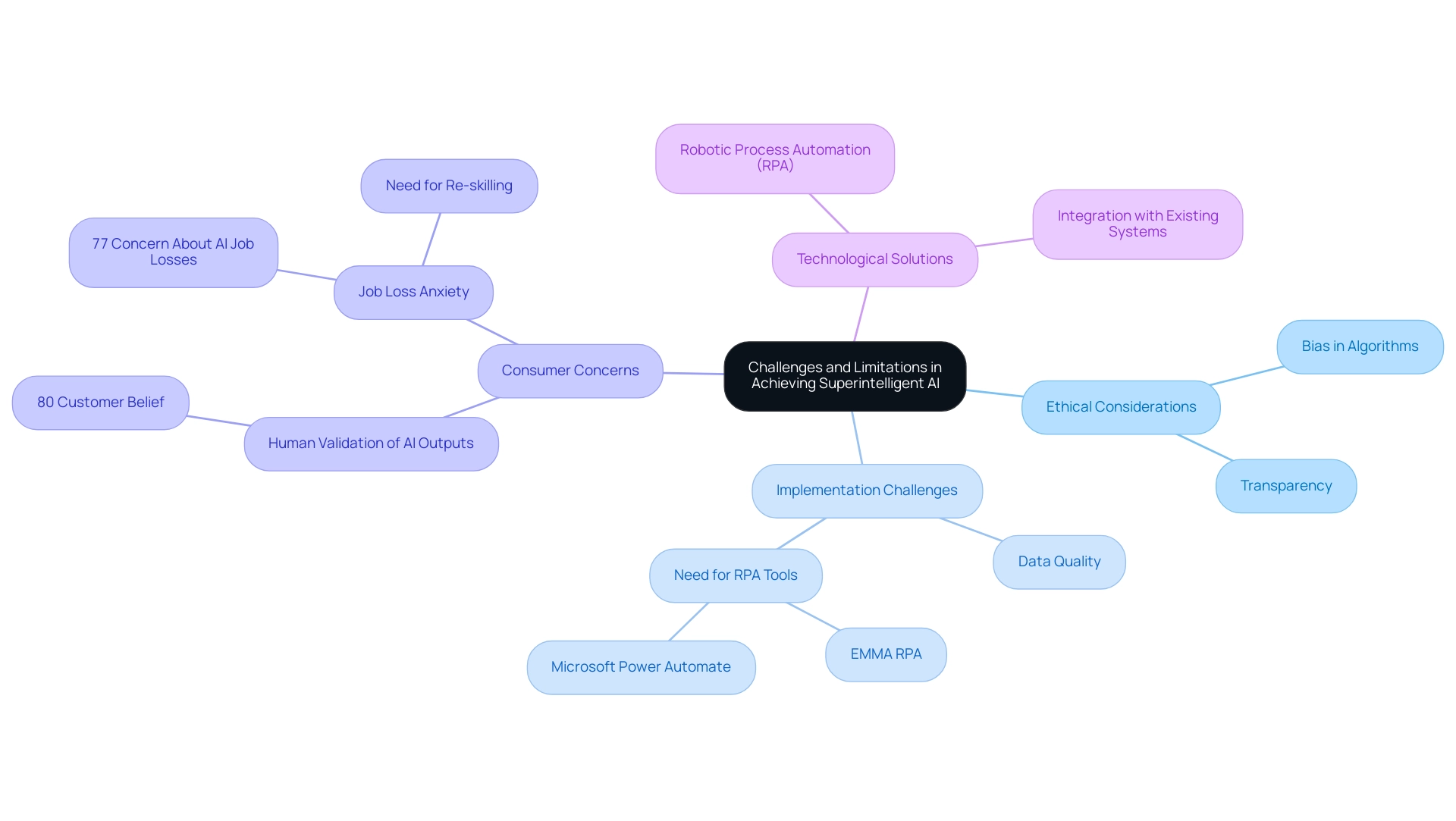
The Importance of Responsible AI Development
The evolution of artificial intelligence underscores an urgent need for responsible AI development. Organizations should prioritize establishing ethical frameworks that emphasize transparency, fairness, and accountability. By aligning with emerging regulatory standards and actively engaging stakeholders, organizations can ensure that AI technologies, including generative AI and Robotic Process Automation (RPA), are beneficial to the broader community.
This commitment to responsibility fosters trust in AI solutions, effectively mitigating risks associated with bias and misuse. Significantly, a recent survey indicated that 30% of company owners expect AI to take on the role of generating website copy, illustrating the growing reliance on AI systems. Furthermore, with over 4 billion voice assistants currently in use and projections to reach 8.4 billion by 2024, it is evident that voice assistants are rapidly integrating into daily life, outpacing human population growth.
By cultivating a culture of responsibility and ethical implementation, along with providing hands-on training and integration strategies, entities not only adhere to standards but also position themselves as pioneers in the responsible deployment of AI technologies. Our GenAI workshops specifically enhance personalized customer experiences by teaching businesses how to effectively utilize AI-powered chatbots and recommendation systems. As McKinsey aptly states, ‘Technology’s generational moment with generative AI: A CIO and CTO guide.’
Such proactive measures are essential as we approach 2024, where the emphasis on ethical frameworks for AI transparency and accountability will be paramount. We invite you to book a free consultation to explore how our tailored AI solutions can empower your entity.
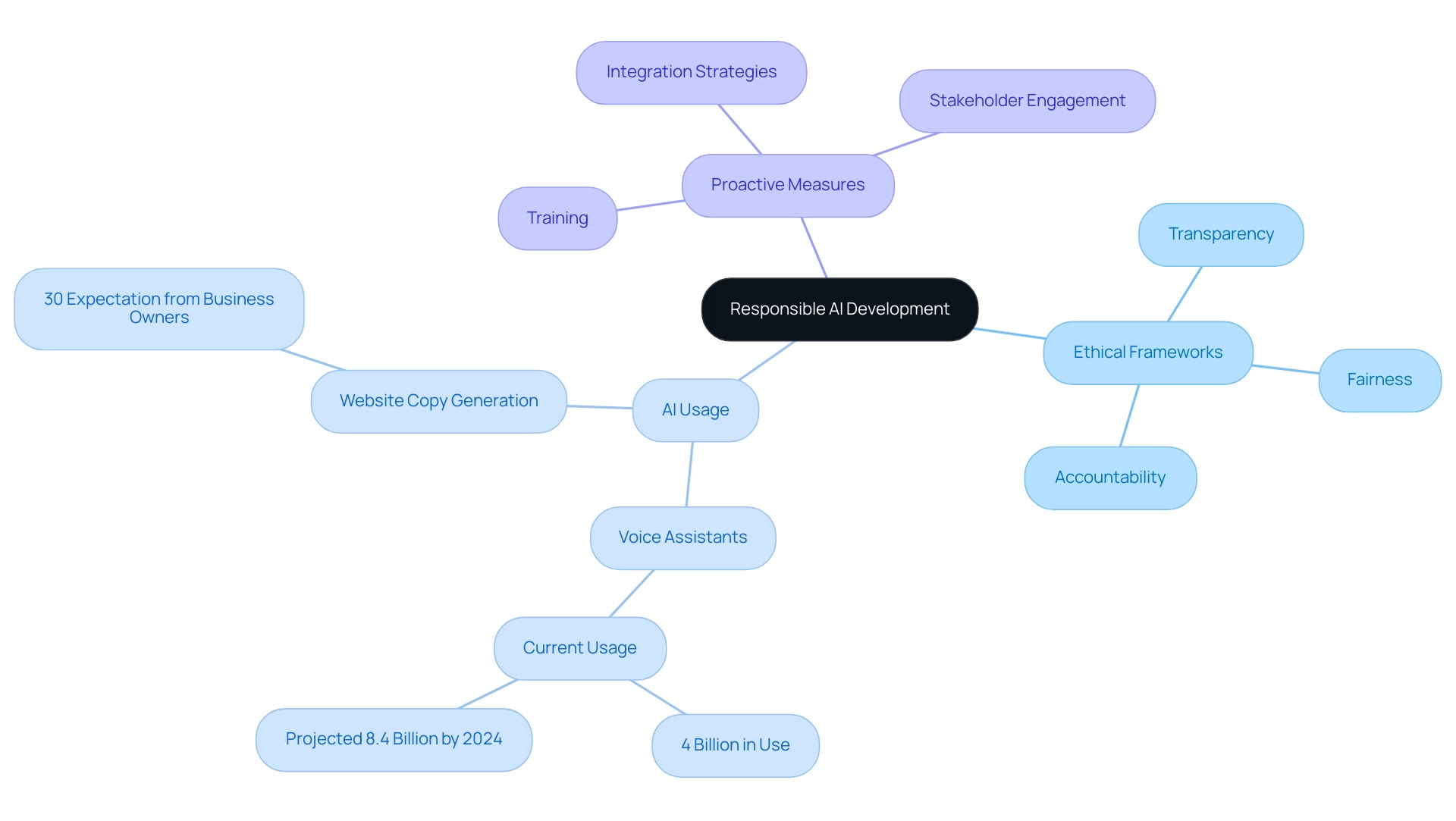
Practical Steps for Organizations to Enhance AI Implementation
To effectively enhance AI implementation and operational efficiency, organizations can adopt several practical strategies. A comprehensive assessment of existing processes is crucial, as it helps pinpoint areas where Robotic Process Automation (RPA) can streamline workflows, reduce errors, and free up team resources, generating significant value. For instance, the expectation that 30% of entrepreneurs foresee AI generating website copy for their companies illustrates the potential for efficiency gains.
Furthermore, investing in robust training programs for employees is essential; such initiatives not only foster a culture of innovation but also minimize resistance to change, particularly among the 68% of non-users from the Gen X and Baby Boomer demographics. Tailored training programs can specifically address their concerns, facilitating smoother adoption of both AI and RPA technologies. Working together with AI specialists guarantees that approaches are aligned with specific business goals, maximizing the effectiveness of initiatives aimed at enhancing business productivity.
Additionally, leveraging Business Intelligence is vital for transforming raw data into actionable insights, enabling informed decision-making that drives growth and innovation. Establishing clear metrics to evaluate the performance and impact of these solutions is also crucial for facilitating continuous improvement. The case study on AI usage by age highlights that while 30.8% of individuals aged 61+ use virtual assistants weekly, over 80% of those aged 18-25 have never utilized a large language model, illustrating the differing adoption rates of AI innovations across demographics.
By embracing these steps and leveraging RPA and Business Intelligence, entities can adeptly navigate the complexities of technology implementation, ultimately driving operational efficiency and positioning themselves for future success.
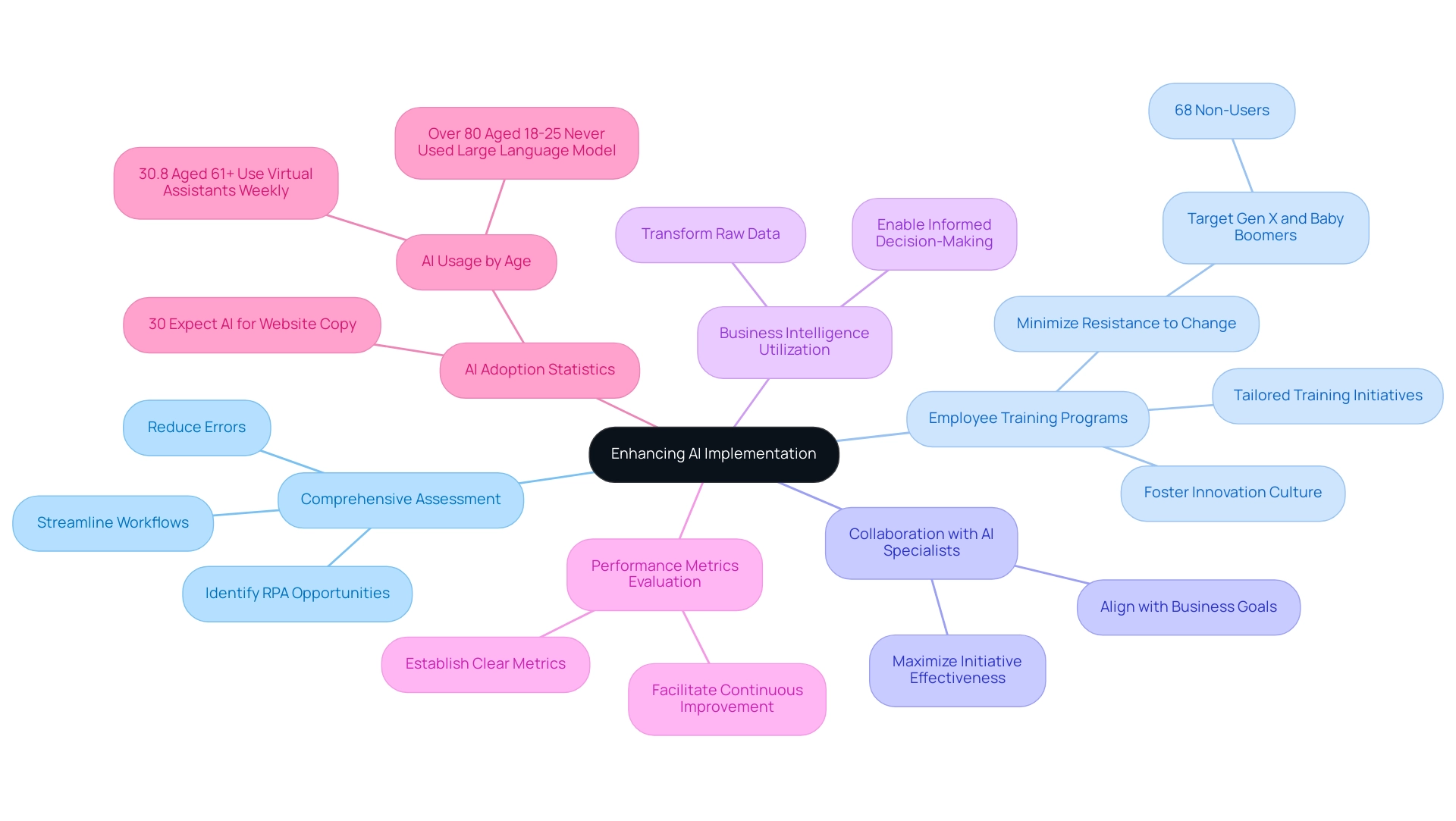
The Future of AI and Its Impact on Business
The future of AI, particularly when combined with Robotic Process Automation (RPA), promises to be a game changer for practices across various industries. As organizations navigate the rapidly evolving AI landscape, they can anticipate increasingly sophisticated solutions designed to enhance decision-making, automate intricate processes, and spur innovation. By leveraging RPA, businesses can streamline manual workflows, significantly boosting operational efficiency and productivity while reducing errors and freeing up teams for more strategic, value-adding work.
The integration of AI with advanced systems such as the Internet of Things (IoT) and blockchain is poised to enhance its impact, opening new pathways for growth. For instance, the self-driving car market has emerged as a substantial economic force, grossing $173 billion in global revenue, showcasing AI’s potential to revolutionize sectors. However, challenges persist, as 40% of executives perceive advanced AI systems and the required expertise for implementation as prohibitively expensive, which creates a barrier to widespread adoption.
With over 4 billion voice assistants in use globally, the demand for AI technologies is clear. In today’s data-rich environment, struggling to extract meaningful insights can leave organizations at a competitive disadvantage. Therefore, it is crucial to unlock the power of Business Intelligence to transform raw data into actionable insights, enabling informed decision-making that drives growth and innovation.
As businesses embrace these advancements, it is essential to remain aware of ethical considerations and ensure responsible implementation of AI. By proactively embracing customized AI approaches and Business Intelligence, entities can position themselves at the forefront of their sectors, enhancing operational efficiency and fostering a culture of innovation that drives future success. Learn more about how our tailored AI solutions and RPA services can help your organization thrive.
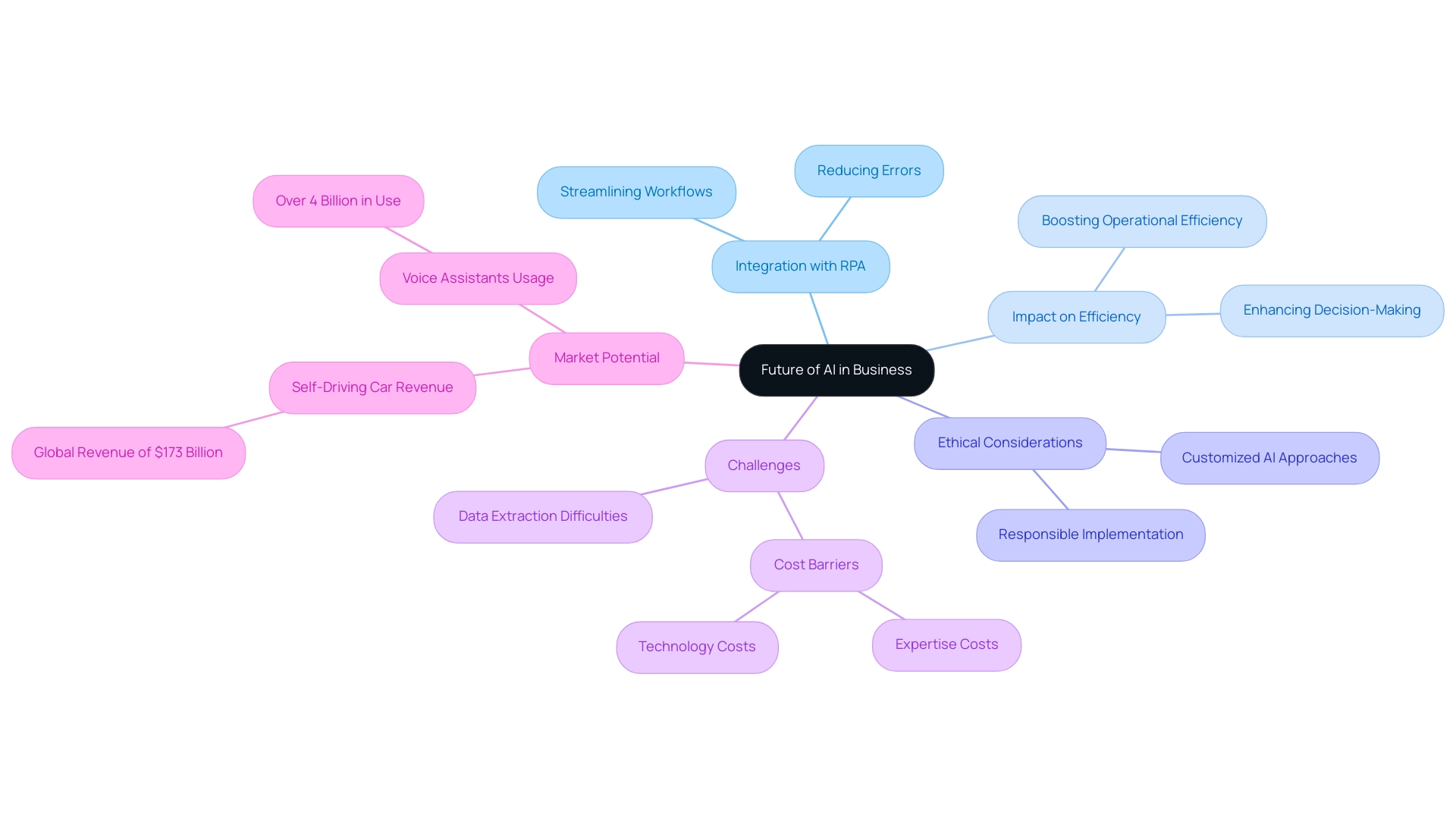
Conclusion
Organizations stand at a pivotal crossroads in the realm of artificial intelligence, where the balance between innovation and ethical responsibility is more critical than ever. As highlighted throughout this discussion, embracing AI technologies like generative AI and Robotic Process Automation (RPA) can significantly enhance operational efficiency and productivity. However, this journey is not without its challenges. Companies must navigate implementation hurdles, address data quality issues, and confront societal concerns regarding job displacement.
To successfully harness the potential of AI, organizations should prioritize the establishment of ethical frameworks that promote transparency, fairness, and accountability. By doing so, they not only foster trust among stakeholders but also mitigate risks associated with bias and misuse of technology. The proactive adoption of tailored AI solutions, combined with robust training programs and collaboration with AI experts, will empower businesses to integrate these advanced technologies effectively into their operations.
Looking ahead, the future of AI integration promises to reshape business practices across industries. As organizations leverage RPA and Business Intelligence to streamline processes and drive innovation, they must remain vigilant about the ethical implications of their technologies. By committing to responsible AI development and implementation, businesses can not only enhance their operational capabilities but also contribute positively to the broader community, ensuring that the evolution of AI serves as a force for good. Embracing this holistic approach will position organizations as leaders in their fields, ready to thrive in an increasingly AI-driven world.

